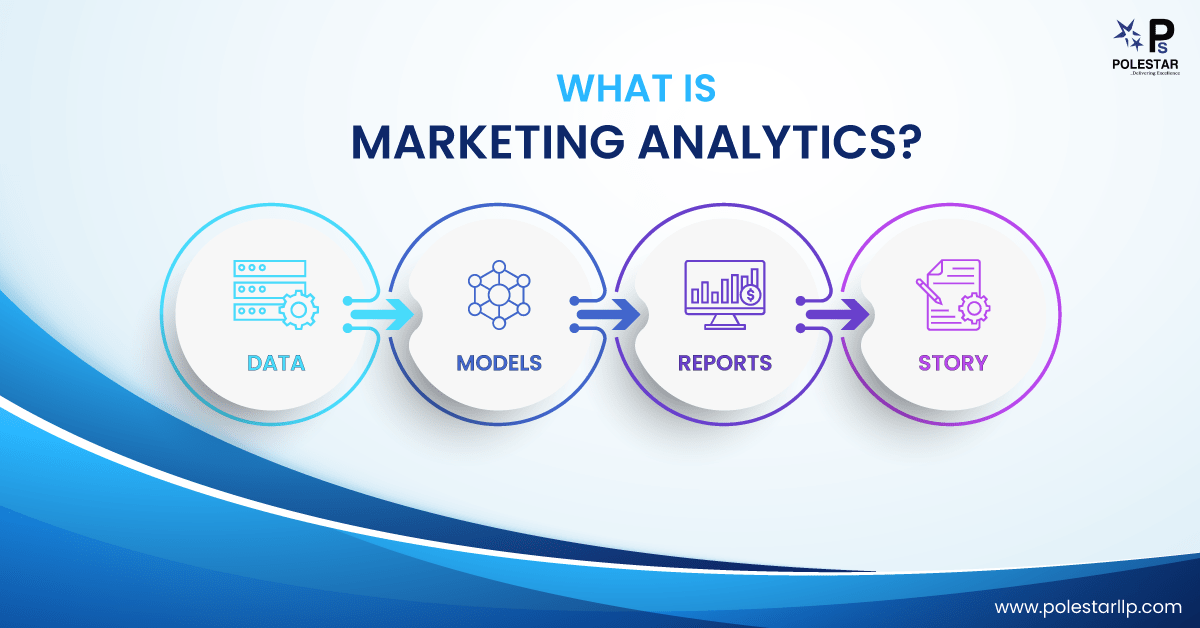Updated on 29/04/2022
The influx of digital technologies has transformed businesses today. Especially the domain of marketing has been fundamentally changed and marketing analytics has emerged as an essential component of digital marketing strategy to measure and optimize the marketing efforts.
Unlike newspapers and magazine advertisements, digital campaigns leave behind a tonne of digital footprints in terms of valuable data points. which a marketer can use to understand what areas are performing well, and what are not, by measuring the impact of your initiatives and campaigns.
There are challenges, however. Typically, marketing processes tend to span across several different channels and this can make it challenging for businesses to derive a unified intelligence by accessing the data scattered in multiple siloes. With an integrated marketing analytics plan, you can build a solid architecture to bring the diverse data points into a common repository, and build a reporting layer on top of it to gain a single source of truth to important business KPIs, such as understanding the contribution of your marketing campaigns to your bottom-line revenue growth.
By developing an effective marketing analytics strategy, you can optimise your campaigns, creating a bigger impact and proving the value to the stakeholders. It will help you to understand which of your ideas are working and which are not working so well and help you to identify the gaps, diagnose your problems and identify what corrective measures you can take to address them.
With insights into audience behavior, you will be in a better position to confidently act on and deliver the best value proposition via the most optimal channel to your target user groups. Marketing analytics strategies will help you to gain insights that will help you to take those important decisions and optimise for business benefits. Before we delve into the analytics strategies let us know what marketing analytics is.
What is Marketing Analytics? Tips and Tools
It is the practice of studying the data of Marketing efforts of various channels and campaigns and form models in order to report the metrics like ROI, Channel Performance, etc. to identify parameters for improvement. Marketers will be able to provide answers to the analytics questions that are most important to their stakeholders by monitoring and reporting on business performance results, diagnostic metrics, and leading indicator metrics.

The intelligence derived from marketing analytics allows you to spend each dollar as effectively as possible.
However, despite the emergence of several platforms and technologies that can streamline the marketing analytics workflows, it remains a challenge for companies to build concrete, actionable data analytics solutions for marketing efforts. According to a survey of senior marketing executives published in the Harvard Business Review, “more than 80% of respondents were dissatisfied with their ability to measure marketing ROI.”
To set up a practical marketing analytics framework within your organisation, you must have the right processes along with investing in the right technology platforms to capture data-driven strategy and deliver unified and consistent information on your measurement metrics.
Marketing Analytics Strategies Process
With marketing analytics, you can gather intelligence into several different areas of your marketing strategy. It will help you understand how your programs are performing against the cost and which programs are delivering the best ROI. It will help you to segregate your efforts and identify the area that you need to focus on the most.
Analytics strategy will help you to realise how your programs are working in conjunction to nurture your leads. With this, you can build a solid base upon which you can qualify them and pass the leads on to your sales reps as opportunities.
With marketing analytics, you can also identify laggards, i.e. the programs that are not providing adequate return based on efforts invested at them. You can then choose to redefine your data-driven strategy at them or remove them from your focus altogether.
Market and competitor analysis will give you crucial insights into your competitor data-driven strategy and which channels/ programs are working for them. Learning from your competitors is an old business principle and marketing analytics can give you a powerful arsenal to use and base your actions on the digital platforms.
Even better! Advanced analytics can provide insights into trends, make forecasts and capitalise on opportunities before anyone else.
This will help grow your bottom line and avoid wastage on marketing spending, optimising the dollar spend and viewing campaign performance in real-time. It helps you to measure the impact of your strategies and compare it against the cost.
Learn how to take new approaches to quotas, territories, roles, and targets based on shifting market dynamics with Data Analytics
5 Marketing Strategies For Your Business
1) Keyword Research– With keyword research, you can obtain very detailed insights into how your business is appealing to your potential customers and if there are areas that you can optimise. View how competitive your target keywords are, the average monthly search volume for that particular keyword, the estimated CPC’s if you decide to bid on those keywords, the number of clicks that you are getting for that keyword and the click-through rates.
2) Website Marketing Analysis– Understand your top pages that are generating a high amount of conversion and getting maximum traffic. Conversely, you can also identify pages that are receiving high traffic but not getting enough conversions. By using heatmaps, you can also analyse how your audience is interacting with each element on your page. Understand, with heatmaps, where your visitors are abandoning your pages. Identify pages that are getting a high bounce. Identify who your audience is, their demographics, which device are they using to access your content, what keywords your webpages are ranking for.
3) Campaign Analytics- Understand how your campaigns are performing, get a real-time view into the leads that are on the nurture list. Understand the lead conversion rate from multiple channels, identify the opportunities by product category and lead source. Identify which content and platform are resonating best with your audience. This will help you optimise the messaging and target of your content strategy.
4) Social media analytics– With social media analytics, you can track the sentiment to understand in real-time how people are responding and engaging with you. It will help you to maximise the impact of taking the right action. Identify your most engaged followers, and understand what improvements can you make to reach more brand evangelists.
5) Link analytics– Links remain one of the crucial ranking factors in search algorithms. With link analytics, you can view the site’s link profile, the domain and page authority of the referring domains, the total number of inbound links, top pages by link, anchor text for the links.
For marketing managers, transparency into business metrics and a common agreement on the different KPIs. This requires them to build competency on their data analytics capabilities and connect the different data points to get a clear insight into the different tactics. Data analytics will deliver useful insights into the important questions that businesses seek. With a data strategy framework, you can analyze the gaps to inform where your business strategy needs tweaking. But you need to ensure that every stakeholder has a common understanding of which metrics are important and how they are going to be measured. Otherwise, they can result in confusion.
Another important aspect of having a reliable marketing analytics framework in place is to create effective analytics dashboards. The dashboard should list down the important KPIs and should be designed using effective design principles that makes it easier to consume the information. Utilizing the principles of data visualization are key here to creating effective dashboards. The dashboard should present KPIs by unifying data strategy from all the different marketing data sources. The dashboard should also provide the necessary levels of customization and personalization to the consumers.
Lastly, it can never be overemphasized how important data storytelling will be to your analytics success. The numbers and KPIs need to be weaved into a narration for business impact. A magical and beautiful analytics dashboard will fail to drive its point unless it is tied to a business question or objective. It also makes the numbers and KPIs more memorable for the executives and business managers.
Some powerful tools such as Power BI, Qlik, and Tableau help to dig in and derive results on your marketing campaign intelligence.
At Polestar Solutions, our team of analytics solution architects and visualization experts can help you gain deep insights into your marketing activities so that you can increase the efficiency of your marketing efforts and spend.
Get in touch and understand how our Qlik & Microsoft experts can help you with world-class marketing analytics solutions customised for your business.
Lastly, it can never be overemphasized how important data storytelling will be to your analytics success. The numbers and KPIs need to be weaved into a narration for business impact. A magical and beautiful analytics dashboard will fail to drive its point unless it is tied to a business question or objective. It also makes the numbers and KPIs more memorable for the executives and business managers.
Know about the potential benefits of customer analytics and use cases in different industries
Conclusion
Get in touch and understand how our Qlik & Microsoft experts can help you with world-class marketing analytics solutions customized for your business.



